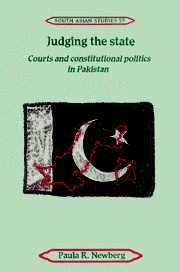Book contents
- Frontmatter
- Contents
- Preface
- Introduction
- 1 Structuring the state
- 2 Constituting the state (1947–1958)
- 3 Confining courts and constitutions (1958–1969)
- 4 Seeking justice (1969–1972)
- 5 Testing courts and constitutionalism (1972–1977)
- 6 Silencing courts, muting justice (1977–1988)
- 7 Reviving judicial powers (1988–1993)
- 8 Judging the state
- Table of cases
- Bibliography
- Index
- Cambridge South Asian Studies
4 - Seeking justice (1969–1972)
Published online by Cambridge University Press: 06 January 2010
- Frontmatter
- Contents
- Preface
- Introduction
- 1 Structuring the state
- 2 Constituting the state (1947–1958)
- 3 Confining courts and constitutions (1958–1969)
- 4 Seeking justice (1969–1972)
- 5 Testing courts and constitutionalism (1972–1977)
- 6 Silencing courts, muting justice (1977–1988)
- 7 Reviving judicial powers (1988–1993)
- 8 Judging the state
- Table of cases
- Bibliography
- Index
- Cambridge South Asian Studies
Summary
Who could have known
that the blood of those words
would drop by drop
become lines that shine?
And now these lines of blood
have in themselves become
a story and a fable.
Ahmad Faraz, “Preface.”A free and uncorrupted right of suffrage does not necessarily satisfy all the demands of liberty. Some of the most menacing encroachments on individual liberty have been made in the name of democratic principles themselves.
Justice Hamoodur RahmanThe authority of executive-dominated government was contested vigorously when Ayub Khan turned over the reins of government to General Yahya Khan. The problems that set the stage for civil war still existed at its conclusion; the impossibility of their resolution in post-election constitution-writing led to war and then the independence of Bangladesh. To clear the way for constitutional rule, the judiciary was asked to take center stage once again. Rulings on the transfer of pre-war power in Asma Jilani's case and the conditions for post-war constitutionalism in Ziaur Rahman's case arbitrated continuing disputes about federalism and executive powers, and focused deeply rooted arguments about political ideology and conscience.
Changing the structure of the state
The decade of development, praised outside Pakistan as the result of dynamic civil–military governance, never disguised the political vacuity of Ayub Khan's government. Deposed Pakistan Times editor Mazhar Ali Khan accused Ayub Khan “of destroying institutions wedded to the public weall [sic], and of victimising individuals who could not be easily browbeaten or purchased.”
- Type
- Chapter
- Information
- Judging the StateCourts and Constitutional Politics in Pakistan, pp. 110 - 135Publisher: Cambridge University PressPrint publication year: 1995

